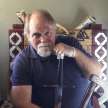Purple Clouds, Poe, and My Pop
for the "Under Purple Clouds" contest

Every night at midnight, the purple clouds came out to dance with the blushing sky. I drew my curtains closed, unable to enjoy the pretty clouds. I lay back down.
I had come to dread them.
Purple clouds have become a harbinger of doom, a sign that trouble was on the way.
They meant my father was coming.
Every single night. Purple clouds. Blushing sky. My father’s visits. Every friggin’ night.
Perhaps I should explain. My father is dead—he died about a year ago. At first, everything was, well, not fine—you don’t feel “fine” because your father died—but things were normal, in the sense that my family and I were grieving—tears, fond memories, missing him. You know—the way normal people feel when someone they love dies.
KNOCK! KNOCK! KNOCK!—there came a knocking on my bedroom door. Then, a voice said, “Mark me!”
“Pop,” I hissed. “Be quiet. I’m coming.” I felt silly—Diana, my wife, can’t hear my father. Apparently, I’m the only one who can. But he bangs on our bedroom door every night, and every night, I’m afraid he’s gonna wake her up.
I got out of bed and shuffled quickly to the door.
“Pop,” I started to say, but then I tripped and fell into the laundry basket.
“YELP!” Daisy the beagle, who’d been peacefully sleeping between the bed and the doorway, didn’t seem to be hurt, but I’d scared the hell out of her.
“My hour is almost come…” Pop continued, trying unsuccessfully to speak in a creepy voice.
I left the room, closed the door, and confronted him in the dining room. “Pop, I know. ‘Sulfrous and tormenting flames,’ blah, blah, blah.”
“You don’t like Hamlet?” he asked.

“Not when you quote it every single night,” I said. “At midnight.” I walked right through him (on purpose, because he hates that), went into the living room, and sat down in a chair.
“I failed raising you,” he said, sinking dejectedly into the chair next to mine. “No appreciation of culture. I bet you haven’t even noticed the purple clouds are a reference to ‘The Raven.’”
“Nope,” I said, reaching down into the cabinet between our chairs and pulling out a bottle of Scotch and two shot glasses.
“See, in ‘The Raven,’ the narrator’s bedchamber had curtains made of purple silk,” Pop continued.
“I don’t care.” I poured myself a shot of Scotch.
“So I made the clouds purple because….”
“If you keep talking, I’m not going to pour you any of this,” I said, gesturing with the bottle. Of course, he can’t drink, being a spirit and all, but he says he can still smell. He appreciates it when I pour a shot for him.
“You are a horrible, undutiful son,” he sniffed. But he stopped trying to talk about Poe and the Raven. “Is that Highland Park?” he asked, looing suddenly cheerful.

“Yes,” I said. “Diana got it for me special, for my birthday.” I picked up my glass, taking a small sip, letting the rich flavor roll around my tongue.
“When’s your birthday?”
“Today,” I said, giving him a baleful look. He’d never remembered even when he’d been alive.
“Hey,” he said defensively. “Time functions differently in the spiritual realm.”
“Shenanigans. I call shenanigans. I don’t believe you.”
He bent over, took a long sniff of Scotch vaper, pointedly not responding. I let it go.
Finally, he said, “So, how’s Diana? The boys?”
“The same as they were last night, Pop.”
“Oh,” he said. “I guess so. Then he was silent.
I just waited. Pop came for the same reason every night. And it’s not to check on his daughter-in-law and his grandkids, whom, to be fair, he doted on when he was alive. And it sure wasn’t to check on the wellbeing of his only son. Me.
That’s not how haunting works. No, ghosts haunt people because they have unfinished business with the living. That’s me. Pop haunts me because he extracted a solemn promise from me on his deathbed, and, as far as he’s concerned, I haven’t delivered on the promise.
“Have you heard anything?” he finally asked.
“I’m surprised it took you this long to ask.”
He looked offended. “That’s not the only reason I come,” he said. “I care about my grandsons. I love my daughter-in-law. And you did promise….”
It was a promise I had regretted making every single night.
“The Promise” isn’t want you think. It’s not about vengeance, or telling somebody he loved them, or a secret treasure to make sure my three boys had money for college. Nope, it’s about a book manuscript.
Yep, the deathbed promise he extracted from me was to get his book manuscript published. It had been his life’s work, his dream.
“Pop,” I said, compassion cutting through my irritation. “Yes, there’s news.”
He sat upright in his chair. In case you’re wondering what ghosts look like, he looks pretty much the same as he did when he was alive. At least that’s the case for “manifestations,” the technical term for a personal haunting—when someone from your past keeps appearing to you.
Yes, I looked it up on Wikipedia.
“There is? When are they going to publish?”
He looked so eager, so hopeful…as sleep-deprived and irritated as I was, I felt bad.
“It’s not good news.”
My father’s manuscript wasn’t some literary tome—a genius novel or a collection of poems. After he’d died, he’d told me he’d met both John Kennedy O’Toole and Emily Dickinson, and that they were both very positive about how well received their posthumous works had been. Nor was his book on a nonfiction topic that might gather interest—not a book on birds or woodworking or winemaking.
No, the title of my father’s magnum opus was The Hitherto Unnoticed Influence of Aramaic Linguistic Structure on the Development of Early Christianity in Syriac Cultures. Try finding a publisher who’d even look at a manuscript with that title.
“What did they say? Did they want a rewrite?”
“They’re not going to request rewrites from a dead author, Pop.”
“That’s true. But you could say you understand the project and tell them you’d be willing to do any necessary revision.”
“They have to want to publish the book in the first place.”
Pop sagged. “They didn’t care at all?”
“They said ‘While the scholarship is insightful, the small market for a specialized work such as this isn’t large enough to justify the expense of publication.”
He was silent for a while—something he never was when he was alive. Then he looked at me, a pained expression in his blue eyes—eyes the same color of gunmetal blue that mine are. “So I guess that’s it.”
As gently as I could, I said, “That was the last press that publishes books on Early Christianity.”
“I don’t understand. My students always said the subject was fascinating. Said ‘it sounds boring at first, but when you get into it, it’s interesting.’”
I didn’t know what to say. “I’m sorry.” It sounded lame even as I said it.
“I guess my ideas won’t live on. They’ll be forgotten,” he said.
“Pop, we remember you. We love you. As long as any of us draws breath, you won’t be forgotten. Diana puts your picture up on the family ofrenda. She even leaves whiskey and pan dulce out for you.”

“It’s not the same thing.”
Now I felt hurt. Not remembering my birthday was one thing. Not caring that I loved him and remembered him was ….
“I don’t mean it like that. You, your family, your mother….they mean the world to me. But I’m talking about my professional life, my work, the things I spent hours working on during the workday.” He looked at me, making eye contact. “You want to think the work you did matters.”
“That makes sense,” I said.
“Well,” he went on. “I can’t fault you. You got off to a slow start, but I have to admit that you’ve done everything you can to get my book published.”
I tried to ignore the crack about the “slow start.” Apparently, he’d expected me to start sending out manuscripts the afternoon I got home from his funeral. I was still pretty deep in grief when he’d started haunting me, three months to the day after his death. “I really did try, Pop.”
He stood up, crossed to me, and put a hand on my shoulder. Of course I couldn’t feel anything, but I appreciated the gesture. “Thank you, son. Thank you for trying.”
He turned and started walking to the door.
“Pop, they did say ‘the scholarship is insightful.’”
He turned back, a sad smile on his face. “That’s editor-speak for ‘I’m not interested but I’m trying to be kind about it.’” Then, he said, “Good bye, son.”
“Bye, Pop.”
I watched him go. He never opens the door and leaves; he toddles over to the front door and just…dissipates.
He was starting to dissolve into mist when I said “WAIT!”
Resolving into a more solid form, he turned back and said, “Yes?”
“The whole time you’ve been haunting me...nearly a year…you’ve never once said ‘good bye.’ You’ve said, ‘Keep trying’ or ‘Don’t be lazy’ or you’ve tried to dictate snarky replies to editors who rejected your book. But not once, have you ever said ‘Good bye.”
He shrugged. “I have to let go.” Then, more gently, he said “I probably shouldn’t have made you promise in the first place. If I had pushed myself a little harder, been a little more focused, I would have sent the book out myself. Maybe if I’d been alive, it would have been harder to reject it.”
“So that’s it?”
“Yes,” he said, coming back over to me. He cupped my cheek in his ghostly hand. I wanted to believe I felt his caress, but I didn’t. “You really have been a good son.”
“No,” I said. I couldn’t believe it. Sure, I was irritated that he woke me every night. I’d come to hate the color purple, especially in clouds, even though it had been my favorite color my whole life. I’d bitched about the time and energy it took to format his manuscript so it looked like a book, to find potential publishers, to send out queries and sample book chapters. I’d hated telling him when I got bad news.
But I also got to spend a part of every night with my father, a man I loved even if he drove me crazy half the time. In the midst of my grief, I’d gotten my father back.
And now, he was leaving, this time for good.
“No, what, son?”
“We haven’t tried foreign publishers,” I blurted out. “What about some in the Middle East? Where they still speak Aramaic?”
He shook his head sadly. “I think you’ve tried hard enough, son. Time to let go. Time for you to get a good night’s sleep.”
“But Pop,” I said, trying to clutch his arm so he wouldn’t go. Of course I went right through him when I tried to grab him.
“Please stop doing that,” he said, “It tickles.”
“German!” I blurted out.
That stopped him. “What?”
“German. A lot of the scholarship on your subject is in German. Maybe we could get your book translated into German.”
He threw his hands up, his ‘surprised’ look when he was still alive. “German? I was at a conference once and met a man named Kirchdorrfer. Said he was interested in my ideas. Maybe he’s still alive.”
“I can find out,” I said. “I’ll find him on the internet. And I’ll look for a translator, too.”
He looked at me for a long time, an odd smile on his face. “Thank you, son.”
I wanted to be casual but was choking back tears when I said, “I’ll see you tomorrow night.”
He nodded. “Tomorrow, then.” He took a step, and said, “And one more thing. Tell Diana I appreciate the empanada she puts on the ofrenda for me. But tell her I really don’t like pineapple. Tell her I prefer pumpkin.”

Then he slowly dissipated into a purple mist and was gone. I went over and peeked out the window, looking up at the purple clouds and the blushing sky.
I’ll see you tomorrow, Pop, I thought, went back into our room, and slipped into bed beside my still-sleeping wife.
About the Creator
Chuck Etheridge
Novelist, Teacher, Transplanted West Texan, Reluctant Poet






Comments (1)
I loved this story! So much description and cleverness within it - puts the reader right there! “After he died he’d met Emily Dickinson and John Kennedy O’Toole..” and the reference to looking it up in Wikipedia.. there is a typo that you might be able to fix with the “quick edit” - Right after “is that Highland Park” it should be looking - the k is missing. What a great imaginative story.